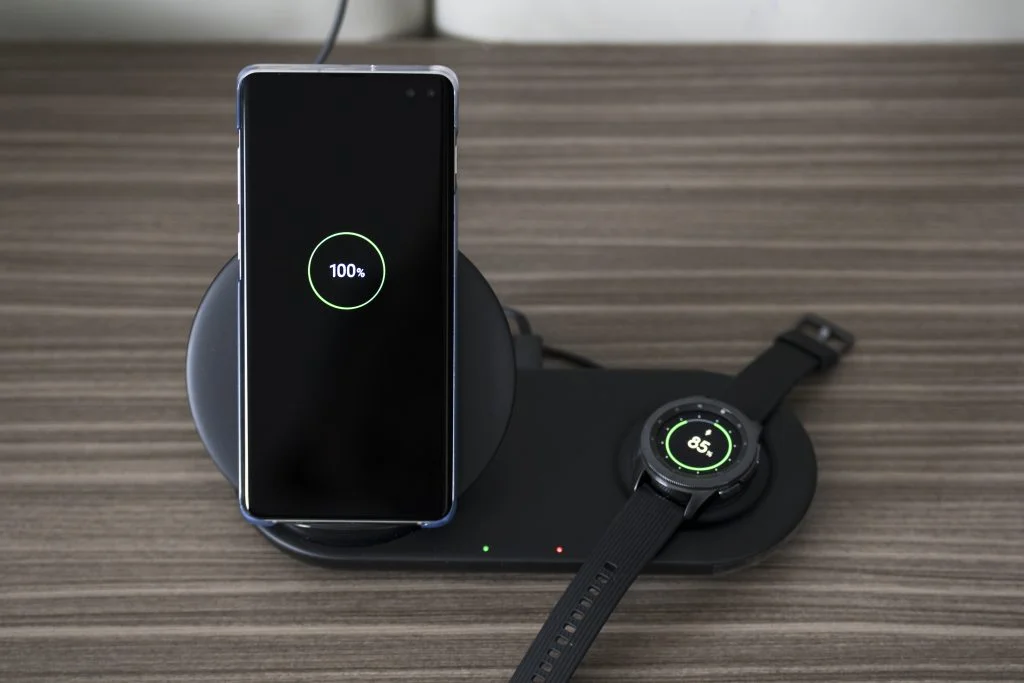How Do I Choose A Wireless Charger?: Advancement in technology not only lets people talk wirelessly (mobile phones) but also lets them charge their devices without connecting with a wire. Many known brands, including Samsung, Nokia, iPhone, Huawei, etc. introduce their phones equipped with wireless technology.
Wireless chargers are now widely used by people to not only charge their mobile phones. They are used to charge products like smartwatches and fit bits, etc. Even then, it is somehow confusing for users who are trying to figure out how to choose the best wireless charger for their phones.

How Wireless Charger Works?
The wireless charger works by transferring power through induction. The current passes through the two coils for creating an electromagnetic field, and it is received by the device that comes in its range.
The electromagnetic field is converted into the direct current (DC) within the device and charges the built-in battery.
Different technologies are used in the wireless chargers. However “Qi is commonly used by many brands. It is pronounced as “Chee.”
You must check the technology that your device supports. In case it is different from the technology used in the charger, it would not work at all.
Different Standards To Consider While Selecting The Wireless Charger
How Do I Choose A Wireless Charger? The following are the few things that you must consider while selecting the wireless charger.
1. Wattage
The selection of wireless charger starts from checking the wattage they offer to charge a mobile phone. Compare it with the wattage of your phone to check that it is feasible to charge the phone with a particular wireless charger.
The wattage requirements varied from brand to brand, and every type of device is available in the market from high wattage requirement to low wattage requirement. Google pixel i3 requires an 18-watt charger to charge it quickly, and the wireless charger using Qi technology can provide the highest wattage up to 15 watts.
Usually, 10 watts is the average power required to charge different mobile phones. Other devices take more time to complete the charging.
2. Connector Type
Various brands offer different plugin options for the charging pads. Some offer adapters while some use weird proprietary jacks.
The micro USB port or USB-C port is used to plug in the charger. However, it is beneficial to go with a standard charger because you can use a standard wire in case the original gets damaged.
However, if the charger comes with a wall adapter, it must ensure that it offers the required wattage. For example, If the charger provides 5 watts, the wireless charger only works at 5 watts instead of having a capacity of 10 watts.
3. Charger Design
How Do I Choose A Wireless Charger: Two different wireless charger designs are available in the market, i.e., flat pad design and phone stand design. You can choose either based on your likes, needs, and requirements.
With the pad design, the phone lays flat over the pad while in the stand design, the phone remains in the semi-upright angle. The stand design lets users view the screen without picking or hover over the phone.
4. Brand
How Do I Choose A Wireless Charger: Various wireless adapter brands are available in the market, and all work in the same way. However, some people are more curious about the different brands because they have to charge their expensive phones and devices.
Therefore, you should buy a known brand instead of getting some new and cheap brands to save some bucks. Usually, low priced brands come with a low-quality electronic chip inside that can damage the phone while charging.
However, using the wireless charger of the same brand as your mobile phone provides some additional benefits.
For example, Google’s pixel stand turns the mobile phone into a makeshift alarm. You can used it as a digital photo frame.
Advantages And Disadvantages Of Using Wireless Chargers
Everything in this world comes with some advantages and disadvantages. Similarly, wireless chargers also have a few pros and cons. Let’s have a look at them.
Advantages
- Wireless chargers offer convenient charging options for people, especially for those who receive numerous phone calls daily. They don’t have the need to connect the wires again and again to charge the phone.
- Charging wires incur damaged after some time. This is because you have to connect it numerous times in a day. Wireless chargers eliminate this problem.
- Compatibility is the primary advantage of wireless chargers. You can charge the mobile phone of any brand if both use the same wireless technology.
- It helps to keep your table clean from charging wires.
Disadvantages
- Performance is the main problem that usually users face in the wireless chargers. It takes more time to complete the charging as compared to standard wire chargers. Fix this by selecting the high watt charger.
- It will stop charging, even if it remains in the range of the electromagnetic field if you pick up the phone and make a call.
Conclusion
Wireless chargers are convenient to use, but it takes some time to find the best one. Read the How Do I Choose A Wireless Charger post carefully for info and what should be considered before buying a wireless charger. It is essential you consider the above discussions while selecting the charger.
It not only helps to ensure quality but also provides safe charging for your mobile phone.
Arthur is a senior member of the communications team who has worked at several well-known companies over the past 10 years. As a writer with many years of experience in the technology sector, focusing on reviewing mobile phones and accessories, he has written about many products or has been hands-on with them at some point



